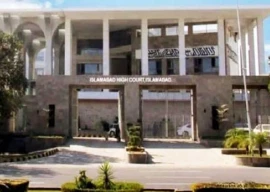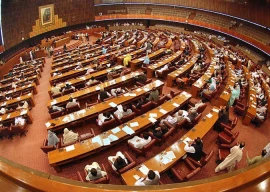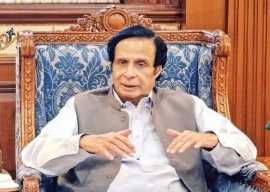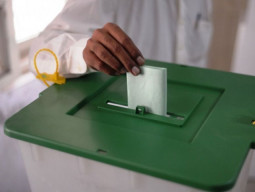
There is something thrillingly forbidden about the appearance of the army chief and the director-general (DG) of the ISI before the parliament. If media reports are anything to go by, the DG left parliament not, exceptionally, elated. The irritation can possibly be because of the aversion of whoever holds the said post from the spotlight of the publicity. The spymaster would have been used to vague references to his existence in hushed tones and benign, imprecise terms like ‘hidden forces’, ‘establishment’, etc. almost like a myth, an urban legend. The agency is (or was) supposed to be seamlessly noiseless, ubiquitous yet invisible, invincible yet almost non-corporeal. Hence, the appearance is unusual in more than one respect. Having to explain himself before a mob of uncouth, rowdy civilians, albeit elected civilians, or having to explain himself at all, must have been irksome. Ironically, at some level, it is reassuring to publicly find the ‘military establishment’ to be, at least, as hazy and guileless as the rest of us.
The intelligence chief apparently took exception to being treated as an enemy. Jean Paul Sartre in a rare lighter observation in the Critique of Dialectical Reason, commenting on football remarks, “In a football match, everything is complicated by the presence of the other team.” The gallant general was obviously not accustomed to having the other team present, but to his good fortune, neither was the other team. To be fair to the general, he admitted to his agency’s failures and was even ‘magnanimous’ enough to offer a resignation if the parliament so demanded, which parliament did not. To the uninitiated, there is a glaring absurdity here. The intelligence chief admitted to the biggest-recorded intelligence failure in the history of the country and ‘offered’ to resign and was not taken up on the offer. In less reverent cultures, he would not have had the opportunity to make the offer because he would have been fired, or would not have been there to begin with, since he would have gone home when his term originally expired.
I in no way intend to downplay the symbolic significance of the appearance of the army and intelligence chief before the parliament. Yet, merely offering oneself for accountability is not enough. If a gaffe of this magnitude was committed and admitted to by a head of another organisation such as the FIA or the PIA, the fallout would have been considerably different. The person responsible for the debacle would have been fired, failing which the Supreme Court would have most certainly taken suo motu cognisance of the government’s inaction. At some level, the appearance of the generals without consequence was not an embarrassment for the armed forces but rather an acknowledgment of the military’s hegemony. The result is that well-meaning parliamentarians have unintentionally given more symbolic authority, not less, to the military men.
The offering for accountability with no consequential accountability may be counterproductive and dangerous. It is dangerous in a purely surreal, inadvertent sense. One needs to be very wary of the seduction of this offer. The real genius of the ‘offer’ lies in its palatability to both the pro-and anti-establishment camps. The pro-establishment group is publicising the generosity of the unprecedented offer of resignation and accountability. Almost equally unprecedented are the pro-military protests in the country with the religious and political right inextricably linking the criticism of the army with patriotism. Islamabad has been especially remarkable in this respect, where even uniformed primary school students chose to participate in midday rallies in the scorching sun to cheer for the armed forces. The anti-establishment camp believes it to be a victory since they have compelled the perennial adversary to its knees and hence, find it impolite to proceed any farther.
The isolated angry diatribes bordering almost on personal vendetta, delivered against the military establishment should not be confused with real courage. The ostensibly saner, realist voices in media and the parliament, articulate the need for being cognisant of realpolitik and to savour the triumph for democracy without getting imprudent or rash. This also seems to be the government line under its breath. The primary fear seems to be of not going overboard, and firing the intelligence or the army chief is as overboard as it gets in Pakistan. The unarticulated fear is that the armed forces will take over if the government is to attempt such a move. It is hard to take exception with the quaint stratagem if the sole aim is self-preservation. The only problem with the cautionary approach is that firstly, it manifests outrageously low expectation and secondly, it insidiously seeks to ensure the status quo. This probably will serve to dampen the crisis and prevent it from aggravating into another insane attempt at military adventurism. Yet it does not excuse us from the realisation that we are becoming willing accomplices in subverting democracy by attempting to soothe the insatiable appetite of the armed forces to run this country.
We as a nation have a fixation with individuals and hence trace the genesis of our plight and panacea to good and bad guys. The good guys are an ambiguous, almost secret group, whereas the bad guys are politicians and retired army generals (retired being the operative word). Hence my argument should not be construed as regards to the individuals in particular, who may be very fine officers, but to the undeniable systemic military arm-twisting. They should be asked to go home politely, yet firmly, by the elected civilian government. This would be a courageous beginning to restoring balance to the civilian-military equilibrium. Merely firing them would certainly not be sufficient in making the military and intelligence subservient to the democratic forces, but it would be a fiery start. If we are fated to suffer apologetic incompetence, we should rather suffer it from our own elected incompetents.
Published in The Express Tribune, May 18th, 2011.

































































COMMENTS (7)
Comments are moderated and generally will be posted if they are on-topic and not abusive.
For more information, please see our Comments FAQ